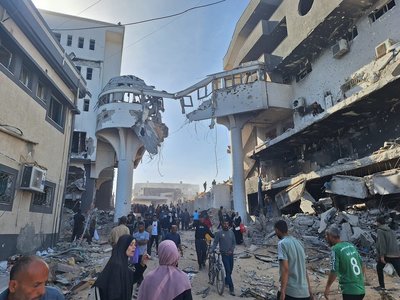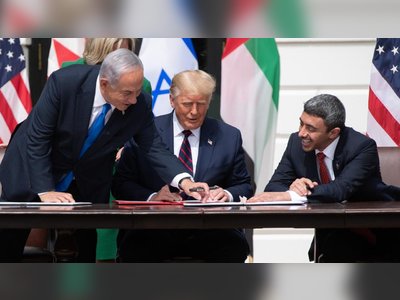Controversy Surrounds 'Muawiya' Series as Several Countries Impose Broadcast Bans
Political and religious tensions emerge as Iraq and Iran ban the controversial series depicting historical figures.
The television series 'Muawiya,' which began airing during the current Ramadan season, has sparked significant controversy related to its content and portrayal of historical events.
The dispute, primarily rooted in political and sectarian themes associated with Muawiya bin Abi Sufyan and the Umayyad dynasty, has led to immediate governmental responses from Iraq and Iran, both of which have imposed bans on the show's broadcast.
Iraq was the first nation to institute a ban through its Communications and Media Commission, citing concerns that airing such a historically contentious work could provoke sectarian discourse and threaten social harmony, particularly during Ramadan.
The commission reinforced that the ban aligns with its legal mandates under legislative order No. 65 of 2004 and its responsibility to regulate media content in accordance with national and professional standards.
In its ruling, the commission urged media outlets to adhere to professional standards and refrain from broadcasting content that may incite sectarian discord or social unrest.
Subsequently, Iran also acted to prohibit the airing of 'Muawiya' across all visual and auditory platforms, including its dubbing into Persian.
The Iranian regulatory body for media stated that the ban was prompted by the series' reinterpretation of Muawiya’s life and efforts to present the Umayyad family in a favorable light, which they found objectionable.
The Iranian authority reported that user-generated platforms had disseminated the original Arabic episodes, which led to cooperative efforts with the Iranian public prosecutor’s office to remove those episodes from circulation.
In Egypt, the show has stirred debate primarily over its representation of the companions of Prophet Muhammad in dramatic works.
Although there has been no formal edict from Al-Azhar or Egypt's Dar al-Ifta against the series, scholars from Al-Azhar have condemned the dramatization of companions, citing previous fatwas that prohibited the portrayal of prophets and certain companions while allowing for the dramatization of others, under the condition of maintaining their honorable reputation.
As the series has continued to air, critiques of its narrative approach and historical inaccuracies have intensified.
Khaled Saleh, the writer of 'Muawiya,' has defended the production amid rising criticisms from viewers and scholars alike.
Notably, the series has also seen internal disputes, as reports emerged of director Tarek Al-Arian requesting the removal of his name from the project following dissatisfaction after some scenes were edited during review processes.
Furthermore, prominent Egyptian author and historian Youssef Zidan criticized the series on social media, claiming it misrepresents historical contexts, depicting the Quraish people as if they were living in Rome rather than Mecca, and portraying Abu Sufyan as a philosopher akin to Socrates.
Zidan expressed his discontent after watching only a portion of the series, labeling its historical inaccuracies as blatant and asserting that it could potentially incite social discord.
The dispute, primarily rooted in political and sectarian themes associated with Muawiya bin Abi Sufyan and the Umayyad dynasty, has led to immediate governmental responses from Iraq and Iran, both of which have imposed bans on the show's broadcast.
Iraq was the first nation to institute a ban through its Communications and Media Commission, citing concerns that airing such a historically contentious work could provoke sectarian discourse and threaten social harmony, particularly during Ramadan.
The commission reinforced that the ban aligns with its legal mandates under legislative order No. 65 of 2004 and its responsibility to regulate media content in accordance with national and professional standards.
In its ruling, the commission urged media outlets to adhere to professional standards and refrain from broadcasting content that may incite sectarian discord or social unrest.
Subsequently, Iran also acted to prohibit the airing of 'Muawiya' across all visual and auditory platforms, including its dubbing into Persian.
The Iranian regulatory body for media stated that the ban was prompted by the series' reinterpretation of Muawiya’s life and efforts to present the Umayyad family in a favorable light, which they found objectionable.
The Iranian authority reported that user-generated platforms had disseminated the original Arabic episodes, which led to cooperative efforts with the Iranian public prosecutor’s office to remove those episodes from circulation.
In Egypt, the show has stirred debate primarily over its representation of the companions of Prophet Muhammad in dramatic works.
Although there has been no formal edict from Al-Azhar or Egypt's Dar al-Ifta against the series, scholars from Al-Azhar have condemned the dramatization of companions, citing previous fatwas that prohibited the portrayal of prophets and certain companions while allowing for the dramatization of others, under the condition of maintaining their honorable reputation.
As the series has continued to air, critiques of its narrative approach and historical inaccuracies have intensified.
Khaled Saleh, the writer of 'Muawiya,' has defended the production amid rising criticisms from viewers and scholars alike.
Notably, the series has also seen internal disputes, as reports emerged of director Tarek Al-Arian requesting the removal of his name from the project following dissatisfaction after some scenes were edited during review processes.
Furthermore, prominent Egyptian author and historian Youssef Zidan criticized the series on social media, claiming it misrepresents historical contexts, depicting the Quraish people as if they were living in Rome rather than Mecca, and portraying Abu Sufyan as a philosopher akin to Socrates.
Zidan expressed his discontent after watching only a portion of the series, labeling its historical inaccuracies as blatant and asserting that it could potentially incite social discord.










